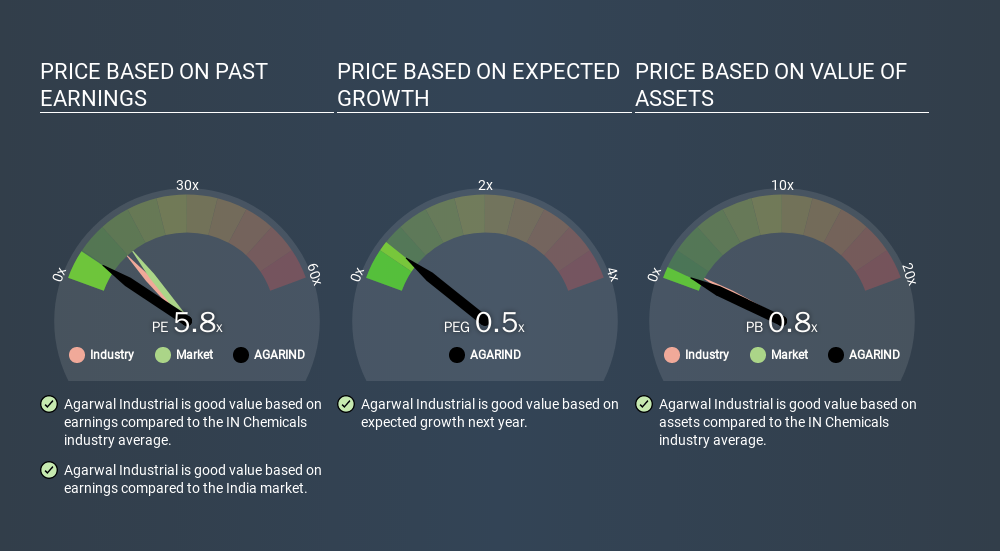What Is Agarwal Industrial's (NSE:AGARIND) P/E Ratio After Its Share Price Rocketed?

Agarwal Industrial (NSE:AGARIND) shareholders are no doubt pleased to see that the share price has bounced 35% in the last month alone, although it is still down 10% over the last quarter. But shareholders may not all be feeling jubilant, since the share price is still down 42% in the last year.
Assuming no other changes, a sharply higher share price makes a stock less attractive to potential buyers. While the market sentiment towards a stock is very changeable, in the long run, the share price will tend to move in the same direction as earnings per share. So some would prefer to hold off buying when there is a lot of optimism towards a stock. One way to gauge market expectations of a stock is to look at its Price to Earnings Ratio (PE Ratio). A high P/E implies that investors have high expectations of what a company can achieve compared to a company with a low P/E ratio.
See our latest analysis for Agarwal Industrial
Does Agarwal Industrial Have A Relatively High Or Low P/E For Its Industry?
Agarwal Industrial's P/E of 5.78 indicates relatively low sentiment towards the stock. We can see in the image below that the average P/E (11.8) for companies in the chemicals industry is higher than Agarwal Industrial's P/E.

Its relatively low P/E ratio indicates that Agarwal Industrial shareholders think it will struggle to do as well as other companies in its industry classification. Many investors like to buy stocks when the market is pessimistic about their prospects. You should delve deeper. I like to check if company insiders have been buying or selling.
How Growth Rates Impact P/E Ratios
Generally speaking the rate of earnings growth has a profound impact on a company's P/E multiple. If earnings are growing quickly, then the 'E' in the equation will increase faster than it would otherwise. That means even if the current P/E is high, it will reduce over time if the share price stays flat. And as that P/E ratio drops, the company will look cheap, unless its share price increases.
Agarwal Industrial's earnings made like a rocket, taking off 95% last year. And earnings per share have improved by 23% annually, over the last three years. So we'd absolutely expect it to have a relatively high P/E ratio.
Remember: P/E Ratios Don't Consider The Balance Sheet
The 'Price' in P/E reflects the market capitalization of the company. In other words, it does not consider any debt or cash that the company may have on the balance sheet. Theoretically, a business can improve its earnings (and produce a lower P/E in the future) by investing in growth. That means taking on debt (or spending its cash).
While growth expenditure doesn't always pay off, the point is that it is a good option to have; but one that the P/E ratio ignores.
Is Debt Impacting Agarwal Industrial's P/E?
Agarwal Industrial's net debt is 58% of its market cap. If you want to compare its P/E ratio to other companies, you should absolutely keep in mind it has significant borrowings.
The Bottom Line On Agarwal Industrial's P/E Ratio
Agarwal Industrial's P/E is 5.8 which is below average (13.8) in the IN market. While the EPS growth last year was strong, the significant debt levels reduce the number of options available to management. If it continues to grow, then the current low P/E may prove to be unjustified. What we know for sure is that investors are becoming less uncomfortable about Agarwal Industrial's prospects, since they have pushed its P/E ratio from 4.3 to 5.8 over the last month. If you like to buy stocks that could be turnaround opportunities, then this one might be a candidate; but if you're more sensitive to price, then you may feel the opportunity has passed.
Investors should be looking to buy stocks that the market is wrong about. If it is underestimating a company, investors can make money by buying and holding the shares until the market corrects itself. So this free report on the analyst consensus forecasts could help you make a master move on this stock.
But note: Agarwal Industrial may not be the best stock to buy. So take a peek at this free list of interesting companies with strong recent earnings growth (and a P/E ratio below 20).
If you spot an error that warrants correction, please contact the editor at editorial-team@simplywallst.com. This article by Simply Wall St is general in nature. It does not constitute a recommendation to buy or sell any stock, and does not take account of your objectives, or your financial situation. Simply Wall St has no position in the stocks mentioned.
We aim to bring you long-term focused research analysis driven by fundamental data. Note that our analysis may not factor in the latest price-sensitive company announcements or qualitative material. Thank you for reading.
About NSEI:AGARIND
Agarwal Industrial
Engages in manufactures and trades petrochemicals in India and internationally.
Adequate balance sheet second-rate dividend payer.
Similar Companies
Market Insights
Community Narratives





